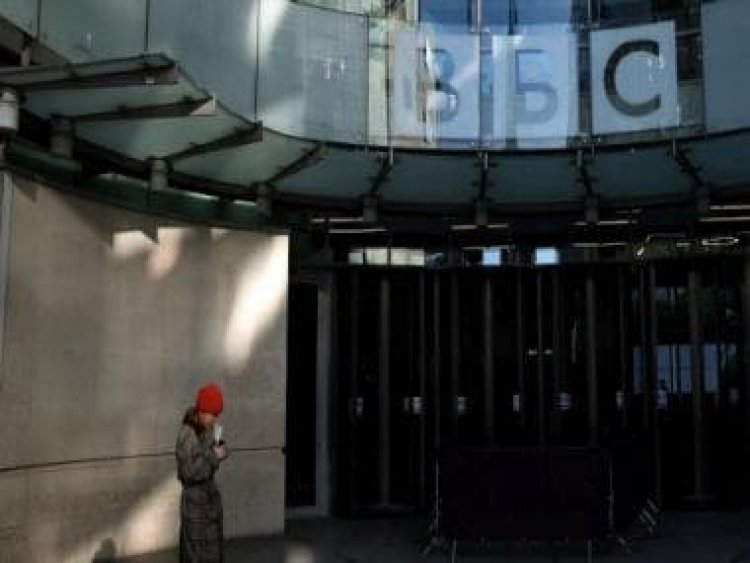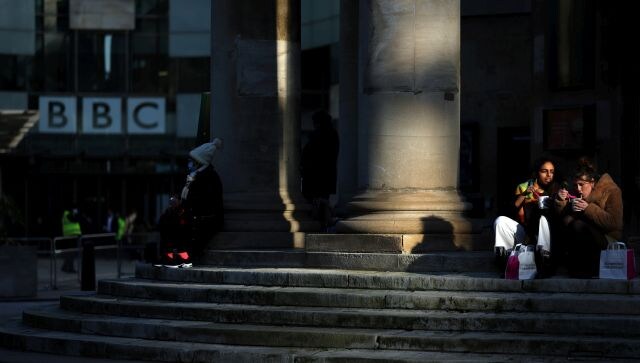Twitter labels BBC as ‘government-funded media’: Who owns UK’s national broadcaster?
Twitter labels BBC as ‘government-funded media’: Who owns UK’s national broadcaster?

It’s the world’s oldest national broadcaster. The BBC completed 100 last year and has now been labelled a “government-funded media” organisation by Elon Muk’s Twitter. The British broadcaster is not pleased and is objecting to the tag on one of its main Twitter accounts.
So what changed? Why did Twitter add the label? And who really runs the BBC? We take a look.
Why has the BBC been branded as ‘government-funded media’?
Twitter has labelled one of BBC’s accounts, which has 2.2 million followers, as government-funded media. However, the label has not been given to the network’s other accounts like BBC World with 39.7 million followers and BBC Breaking News with 51.6 million followers.
The BBC account – @BBC – shares updates about TV programmes produced by the network, radio shows, podcasts and other non-news material.
The social media giant made the change to the official BBC account after adding a similar tag to the American media organisation NPR (National Public Radio).
Twitter had initially labelled NPR as “state-affiliated media”, a tag which is given to Russia’s network RT and China’s Xinhua News Agency. However, it was changed to “government-funded media” after the backlash from the American broadcaster, which said it would not tweet from the account until the label existed. It was then changed to “government-funded media”.
According to Twitter, state-affiliated media outlets are organisations “where the state exercises control over editorial content through financial resources, direct or indirect political pressures, and/or control over production and distribution”.
NPR receives some funding from public institutions but the vast majority comes from sources such as corporate sponsorships and NPR membership fees, reports CNN.
Twitter, however, has not defined what it considers “government-funded media”, the tag that the official BBC handle still carries.

What is the BBC saying?
The BBC has objected to the label and is speaking to Twitter about the new designation on its @BBC account to “resolve this issue as soon as possible”.
“The BBC is, and always has been, independent. We are funded by the British public through the licence fee,” it said in a statement.
How was the BBC formed?
The BBC was founded as the British Broadcasting Company on 18 October 1922. It was a private firm in which British manufacturers held shares.
It took to the airwaves for the first time on 14 November 1922, delivering short news bulletins and the weather. Hardly anyone took notice; only The Times wrote about the broadcasting organisation briefly on one of its inside pages.
In 1926, the BBC gained the attention of the UK public after it covered the general strike that year. Soon the Parliament committee recommended that the private company should be replaced by a public, Crown-chartered organisation. That’s when the BBC – British Broadcasting Corporation – as we know it came into being.
This meant that the organisation is ultimately answerable to British Parliament. However, it enjoys independence regarding its activities.
The BBC had a monopoly on television in the UK until 1954 and on radio until 1972.
The century-old media network is among the most commonly watched free-to-air channels today and is reportedly broadcast in 200 countries. While it is publicly funded, it operates under a Royal Charter.

What is the Royal Charter?
The Royal Charter is the constitutional basis of the BBC, which sets out its object, mission and public purposes. It states that the BBC “should provide duly accurate and impartial news, current affairs and factual programming to build people’s understanding of all parts of the United Kingdom and of the wider world”.
According to the Charter, the Corporation “must be independent”, particularly over “editorial and creative decisions, the times and manner in which its output and services are supplied, and in the management of its affairs”. It outlines the company’s governance and regulatory arrangements, including the role and composition of the BBC Board.
Under the Royal Charter, which is granted by the ruling monarch, the company must obtain a licence from the British home secretary. The Charter must be renewed every 10 years. The current one began on 1 January 2017 and ends on 31 December 2027.
Until 2017, the BBC was regulated by the BBC Trust, a 12-member independent board headed by a chairman who was chosen by the British monarch to supervise daily operations, and a government-appointed regulatory authority, Ofcom. The Trust was abolished in 2016 after an independent review as it was found to be “flawed”.
Now the company is governed by the BBC Board and is regulated by Ofcom. The BBC Board appoints the director-general and other senior executives and issues reports on how it is meeting its public service remit. Four board members and the chair are appointed by the king on the recommendations of the government, but a large majority are named by the board’s nominating committee, according to a report by The Independent.
The executive board oversees its everyday operations.

Who funds the BBC?
The broadcaster is predominantly funded by households in the UK through a licence fee, which is also required to watch non-BBC channels or live services. In 2022, the licence fee raised £3.8 billion for the Corporation, accounting for 71 per cent of its total income of £5.3 billion. The rest came from its commercial activities and grants, royalties and rental income, according to the BBC.
Every household in the UK has to pay the licence fee if they watch programmes shown on any TV channel, stream programmes on online services YouTube or Amazon Prime Video, or download or watch any BBC programmes on BBC iPlayer.
In January last year, the government said that the broadcaster’s funding would be frozen until 2024 – it will remain at £159 annually – and the licence fee will be abolished completely by 2027.
The BBC receives more than £90 million every year from the government to support the BBC World Service, which caters to audiences outside of the UK. It also makes money through its commercial subsidiaries like BBC Studios and advertising on services offered to non-UK audiences, the report says.

Does the government intervene?
No, the BBC is editorially independent of the government. In fact, the media network has been critical of lawmakers, especially the Conservative Party.
The BBC has been accused of having a “liberal” bias and has received backlash for being biased against former UK prime minister Margaret Thatcher during her tenure. It has been slammed for its anti-Brexit coverage during the 2016 referendum.
But it’s not only the Tories who have been critical of the broadcaster. During the 2019 general elections, the BBC was accused of being partial toward Boris Johnson by supporters of Jeremy Corbyn, the former Labour Party chief.
BBC chairman Richard Sharp acknowledged last year that the company has a “liberal bias”. However, Sharp himself remains a controversial figure and is accused of failing to divulge his role in facilitating a loan to Johnson. Senior figures within the BBC believe that the chairman has seriously undermined the Corporation’s impartiality, reports The Guardian.
In January, the BBC was under fire over its documentary “India: The Modi Question”, which revisits the 2002 Gujarat riots when PM Narendra Modi was the state’s chief minister. The Indian government referred to the film as propaganda and accused the Corporation of having a “colonial mindset”. UK premier Rishi Sunak came out in India’s support and said he disagreed with the way the programme was portrayed.
With inputs from agencies
Read all the Latest News, Trending News, Cricket News, Bollywood News,
India News and Entertainment News here. Follow us on Facebook, Twitter and Instagram.
What's Your Reaction?


























































